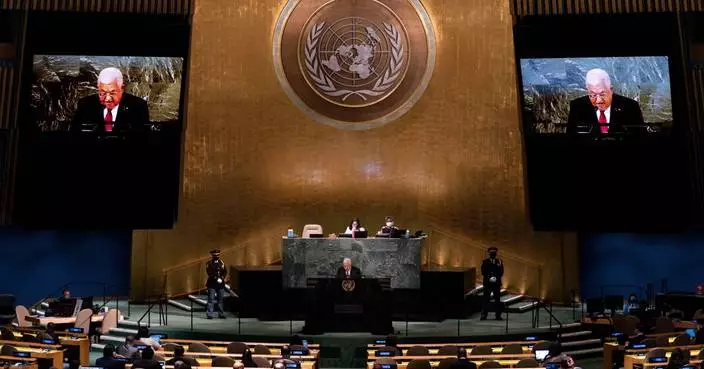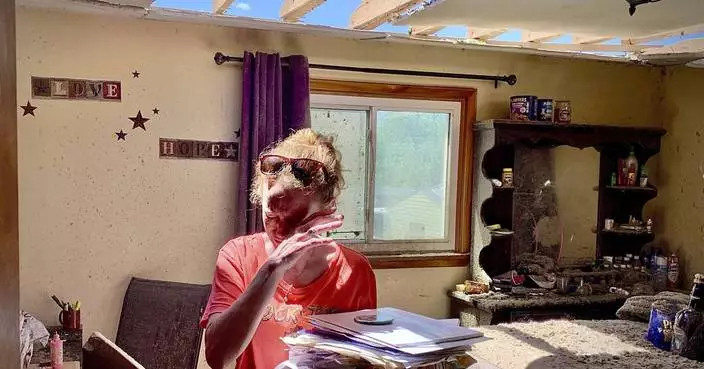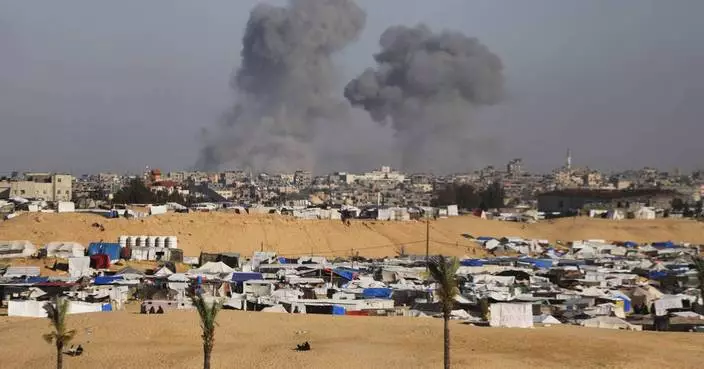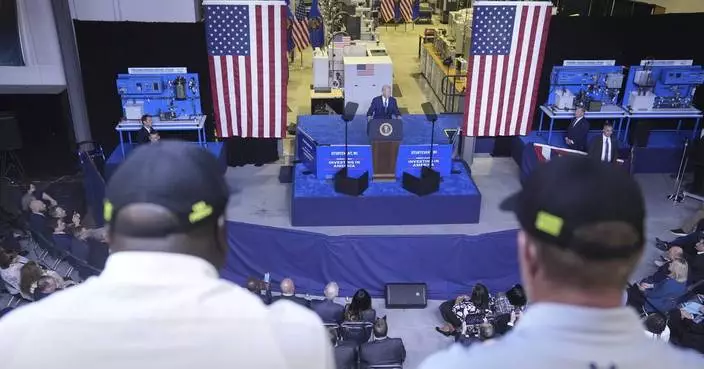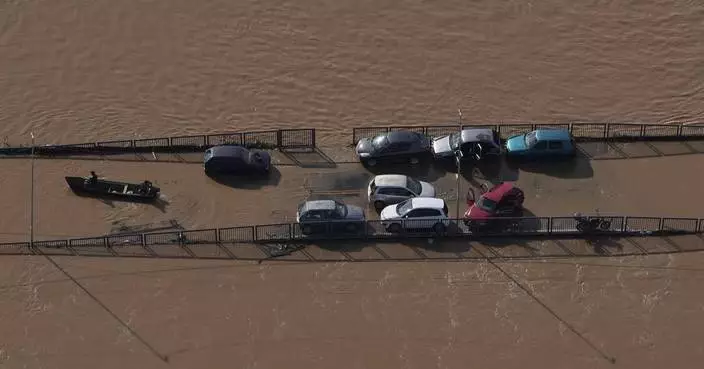The Trump administration said Thursday all eligible small children who were separated from their families as a result of its zero-tolerance immigration policy have been reunited with their parents.
But nearly half of the children under 5 remain apart from their families because of safety concerns, the deportation of their parents and other issues, the administration said.
The administration was under a court mandate to reunite families separated between early May and June 20, when President Donald Trump signed an executive order that stopped separations. The American Civil Liberties Union filed a lawsuit on behalf of a woman who had been separated from her child, and U.S. District Court Judge Dana Sabraw ordered all children reunited with their parents.

In this image taken from video, Javier Garrido Martinez, left and Alan Garcia, right, sit with their 4-year-sons at a news conference in New York, Wednesday, July 11, 2018. They men were reunited with their children after almost two months of separation, Authorities took their boys them when they stopped at the U.S. southern border. (AP Photo/Robert Bumsted)
Fifty-seven children were reunited with their parents as of Thursday morning, administration officials said.
"Throughout the reunification process, our goal has been the well-being of the children and returning them to a safe environment," according to a statement from the heads of the three agencies responsible for the process. "Of course, there remains a tremendous amount of hard work and similar obstacles facing our teams in reuniting the remaining families. The Trump administration does not approach this mission lightly."
Most of the reunions occurred by Tuesday's court-ordered deadline, but the government acknowledged in a court filing that 19 occurred Wednesday and one Thursday.
The ACLU proposed in a court filing that the administration should be monitored closely as a July 26 deadline approaches to reunite more than 2,000 children who are 5 and older with their parents. It asked the judge to require that all parental relations be verified and all background checks be completed by next Thursday. It also wants a daily report on how many families are reunited, starting Tuesday.
The ACLU also proposed that the administration be given no more than a week to reunite 12 young children with their now-deported parents, from whom they were separated at the border. The clock would start ticking as soon as the parent obtains travel documents for the child.
"There is no excuse for the Trump administration's missed deadline," said ACLU attorney Lee Gelernt. "Children are suffering because of it. The government must get these families back together."
The administration said in its filing that it is difficult to determine how much time is needed and that reunifications should occur "on a flexible schedule."
Both sides are due back in court Friday to expand on their proposals. It will be the fourth hearing in eight days, an indication of how closely the judge is watching his deadlines.
The U.S. officials said 46 of the children were not eligible to be reunited with their parents; a dozen parents had already been deported and were being contacted by the administration. Nine were in custody of the U.S. Marshals Service for other offenses. One adult's location was unknown, they said.
Of the deported parents, officials said they had chosen to leave their children behind. One deported father, however, told the Los Angeles Times earlier this week that he didn't realize what he was doing when he signed the paperwork to leave his child behind. It wasn't clear if he was one of the dozen; no names have been made public.
In 22 other cases, adults posed safety concerns, they said. Officials said 11 adults had serious criminal histories including child cruelty, murder or human smuggling. Seven were not determined to be a parent, one had a false birth certificate, one had allegedly abused the child. Another planned to house the child with an adult charged with sexually abusing a child.
"The seriousness of the crimes is the reason why we are not going to reunite them," Matthew Albence of Immigration and Customs Enforcement said of the 22 cases.
The 46 children will remain in the care of Health and Human Services, which will continue to seek to place them with a sponsor, such as another family member or even foster care, as it does for the more than 10,000 other minors who arrived in the U.S. without a relative. Children spend an average of 57 days in shelters before they're placed with a sponsor. They are given access to medical care and counseling, as well as school.
The zero-tolerance policy calls for the criminal prosecution of anyone caught crossing the border illegally. Because parents can't take their children to jail, they were separated. The move caused an international uproar. At least 2,300 children were separated from about 2,200 adults until the executive order was signed. Federal officials have been scrambling to reunite the children under a tight, two-week deadline set by the judge.
Part of the issue, administration officials said, is that the systems weren't set up to reunify parents with their children. Health and Human Services manages their care inside the U.S. Homeland Security has control over adults in immigration detention, and the Justice Department manages the immigration courts.
Earlier this week, government attorneys told Sabraw that the Trump administration would not meet the deadline for about 20 children under 5 because it needed more time to track down parents who have already been deported or released into the U.S.
Sabraw indicated more time would be allowed only in specific cases where the government showed good reasons for a delay.
DUMA, West Bank (AP) — Charred homes and cars dotting this hilltop village surrounded by olive groves are a searing reminder of Palestinians' vulnerability to rising violence from Israeli settlers.
The trail of wreckage along Duma's main road is the aftermath of a three-hour attack in mid-April that left 15 homes damaged by arson and six residents injured by bullets, the head of its village council said. It was one of nearly 800 settler attacks against Palestinians in the occupied West Bank since Hamas attacked Israel from the Gaza Strip on Oct. 7, according to the U.N.
The burnt remains in Duma also highlight the village's limited resources to clean up and rebuild, let alone defend itself from future incursions, which seem inevitable as gun-toting settlers patrol the area roughly 20 miles (30 kilometers) north of Jerusalem.
“We as the village of Duma ... do not have the power to defend ourselves,” said Suleiman Dawabsha, chairman of the village council for this community of more than 2,000 people. He estimated the attack caused five million shekels ($1.3 million) in damage.
The rampage on April 13 echoed a similar event that took place almost a decade ago. In 2015, three Palestinians from Duma were killed, including an 18 month-old baby, after settlers fire-bombed a home there. An Israeli man was later convicted for murder.
The latest attack against Duma was part of a wave of settler violence touched off by the death of a 14-year-old Israeli who went missing on the morning of April 12. Authorities found his body the next day and they have arrested a man from Duma who they say was connected to the boy's alleged murder.
On April 15, two days after the attack in Duma, two Palestinians were shot dead by settlers near the town of Aqraba, according to the Palestinian Health Ministry. And in a related spurt of violence, a man was killed by Israeli fire on April 12 in nearby al-Mughayyir, though it remains unclear whether the fatal bullet was fired by a soldier or settler.
There have been 794 settler attacks against Palestinians in the West Bank since Oct. 7 — from stones thrown at passing cars to bullets fired at residents, according to the United Nations Office for the Coordination of Humanitarian Affairs. At least 10 Palestinians have been killed by settlers in these attacks, it said.
Attacks by settlers aren't the only form of violence on the rise in the West Bank.
Since the war in Gaza began, nearly 500 Palestinians have been killed by Israeli fire in the territory, according to the Health Ministry based in Ramallah, which says the overwhelming majority have been shot dead by soldiers. Palestinians in the West Bank have killed nine Israelis, including five soldiers, since Oct. 7, according to U.N. data.
The war has undoubtedly heightened tensions between settlers and Palestinians. But Israeli human rights groups blame the far-right government of Prime Minister Benjamin Netanyahu for fueling settler violence by promoting an ideology of total Israeli supremacy in the West Bank.
These groups say the Israeli army doesn't do enough to stop the violence, and even facilitates it in some cases by offering the settlers protection. The Israeli army said in a statement it tries to protect everyone living in the West Bank and that complaints about soldiers are investigated.
No one was killed in the attack on Duma, but residents described narrow escapes.
Ibrahim Dawabsha, a truck driver and father of four, said most of his family hid in the kitchen as settlers launched firebombs and set part of their home ablaze.
“My daughter was at her uncle’s house, there was no one there,” he said. “What they (might) do to her I don’t know.”
The heads of Duma and al-Mughayyir said Israeli troops arrived shortly after the attacks on their communities began but did little to intervene. Instead, they fired at Palestinians attempting to confront the settlers, these officials said.
A prominent Israeli human rights group, Yesh Din, described it as an “umbrella of security” — a collaboration it says has become increasingly common since Israel's right-wing coalition government came to power in late 2022.
“As soon as the Palestinians try to protect themselves, they’re the ones who the army attacks,” said Ziv Stahl, Yesh Din’s director.
The United States has increased pressure on Israel to curb settler attacks in the West Bank, sanctioning some leaders, including a close ally of Israel's far-right national security minister, Itamar Ben-Gvir.
Dawabsha, the chief of Duma, does not believe the pressure campaign will be effective. “I am not pinning my hopes on the American government,” he said.
Israel captured the West Bank, east Jerusalem and Gaza in the 1967 Mideast war, territories Palestinians want as part of a future state. Settlers claim the West Bank, home to some 3 million Palestinians, is their biblical birthright.
Around 500,000 Israeli settlers live across hundreds of settlements and outposts in the West Bank. These segregated and tightly guarded communities vary in size and nature. Larger settlements are akin to Jerusalem’s sprawling suburbs, while smaller unauthorized outposts can consist of just a few caravans parked on a hilltop.
Outposts often receive tacit government support and sometimes they gain formal recognition — and receive funding — from the Israeli government.
Duma's geography makes it uniquely vulnerable to attack.
Overlooking Jordan and Israeli settlements to the east, the village is surrounded more closely by at least three outposts that the head of its council says have expanded gradually over the past decade. Duma is in a section of the West Bank known as Area B: Its civil affairs are governed by the Palestinian Authority, but the Israeli military is in charge of its security.
Palestinians largely consider the PA to be ineffective and corrupt, and it rarely opposes Israel's military operations in the territory.
Over the past year, settlers have cut off Duma's access to four vital springs and wells that surround the village by sabotaging roads and other infrastructure, according to residents.
In the days following Hamas' Oct. 7 attack on southern Israel, more than 100 Bedouin Arabs that were living a nomadic lifestyle in the pastures south of Duma relocated to its fringes in search of greater safety and resources.
One of them, Ali Zawahiri, said his extended family relocated after settlers had begun burning their tents and stealing their livestock in apparent revenge attacks. The Bedouin Arabs living near Duma are one of 16 such communities in the West Bank that have relocated because of settler violence or threats since the start of 2023, according to Yesh Din.
"He is armed with a gun and I am just a person with nothing,” Zawahiri said.
An armed unit run by the Palestinian Authority that formerly patrolled the perimeter of West Bank towns at night halted operations shortly after the Gaza war broke out, when members of the force were kidnapped by settlers.
When asked how they might better defend themselves in the future, residents of Duma struggled to answer.
“What preparations?" said Ibrahim Dawabsha, whose truck — his main source of income — was burnt to ashes. "There are no preparations.”
Associated Press video journalist Imad Isseid contributed to this report.
This story has been corrected to show that some 3 million Palestinians live in the West Bank. An earlier version said there were 2,000.
Follow AP's coverage at https://apnews.com/hub/israel-hamas-war
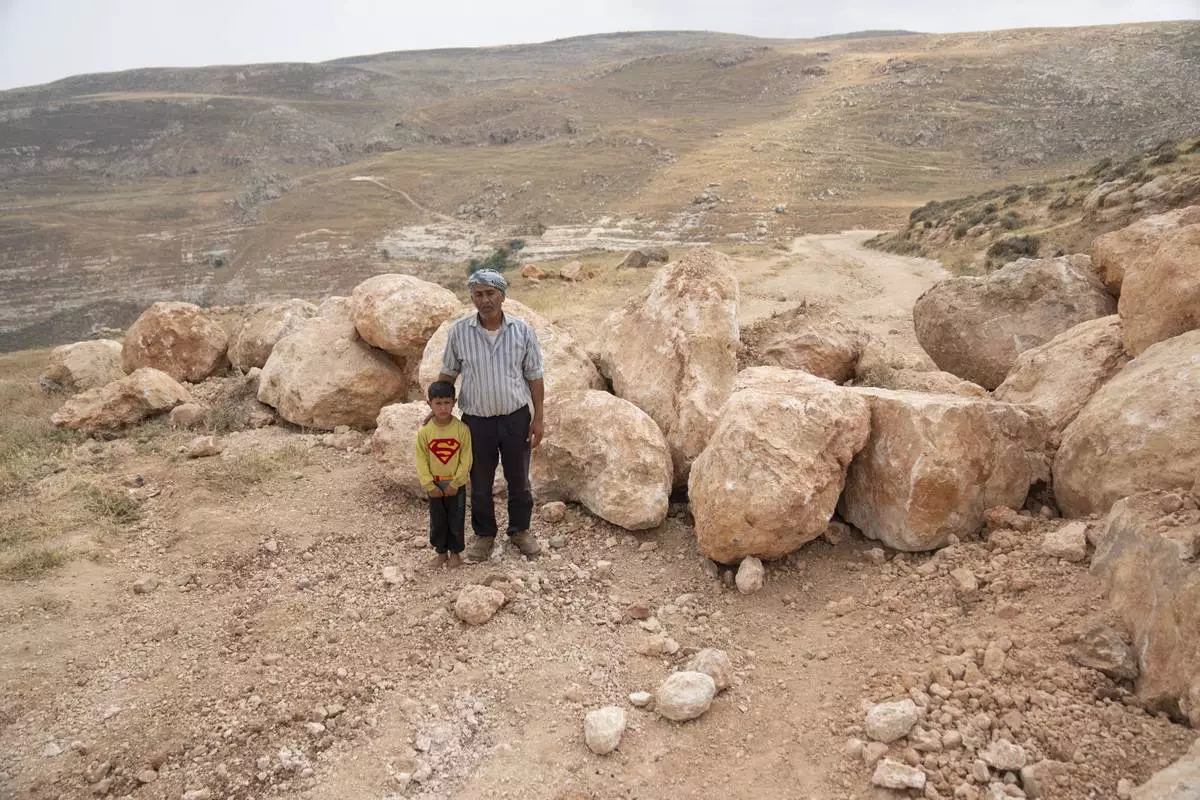
Bedouin Khaled Arara, 54, and his son Ali, 7, pose for a picture on the road leading to his hamlet that was closed with rocks by Israeli settlers, Tuesday, April 30, 2024. (AP Photo/Nasser Nasser)

A Bedouin man attends his herd after he fled his home following a wave of attacks by Israeli settlers, Tuesday, April 30, 2024. (AP Photo/Nasser Nasser)

An Israeli settlers' outpost on a hilltop, right, is seen from outskirts of the West Bank town of Duma, Tuesday, April 30, 2024. (AP Photo/Nasser Nasser)

Bedouins fled their homes on the far hillside seen in the background following a wave of attacks by Israeli settlers, Tuesday, April 30, 2024. (AP Photo/Nasser Nasser)
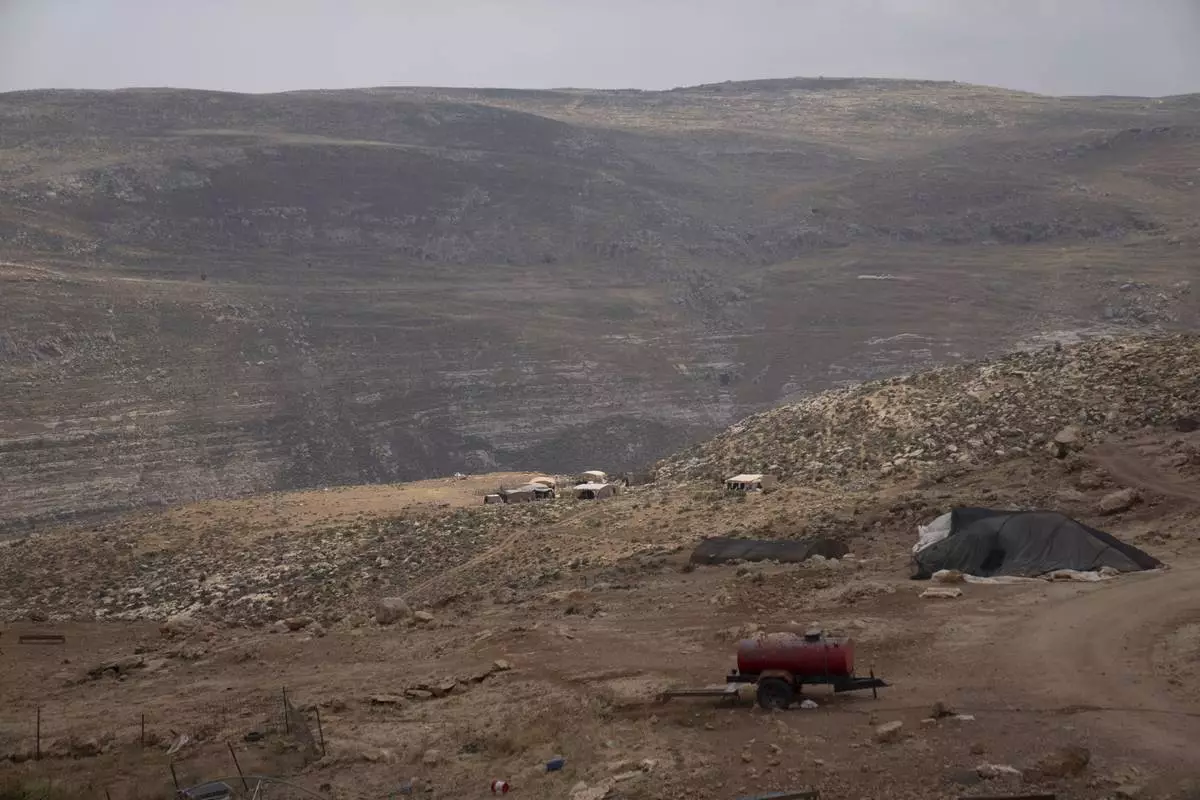
Bedouins fled their homes on the far hillside seen in the background following a wave of attacks by Israeli settlers, Tuesday, April 30, 2024. (AP Photo/Nasser Nasser)
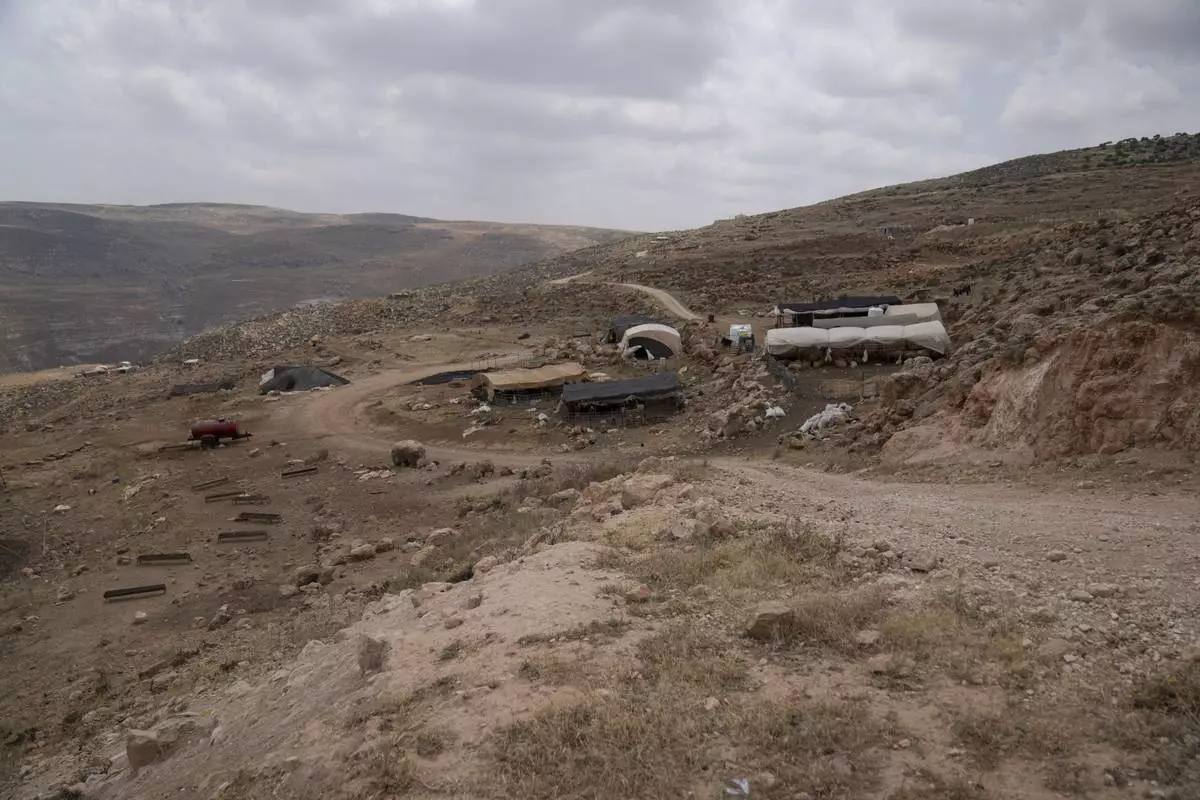
A Bedouin man fled his home on the far hillside seen in the background following a wave of attacks by Israeli settlers, Tuesday, April 30, 2024. (AP Photo/Nasser Nasser)
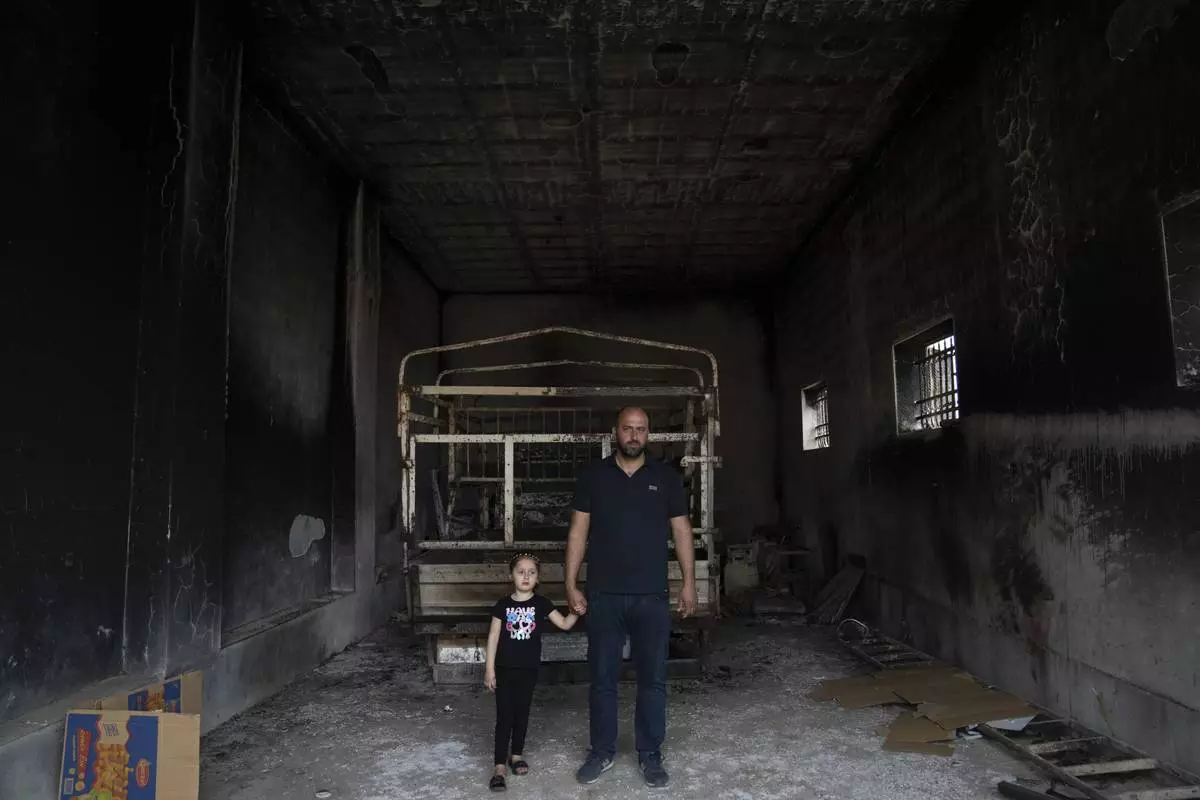
Ibrahim Dawabsha, 34, holds hands with his daughter Ghena, 3 while posing for a picture in front of his truck, at the garage of the family house, that was torched during an attack by Israel settlers last month, in the West Bank village of Duma, Tuesday, April 30, 2024. (AP Photo/Nasser Nasser)
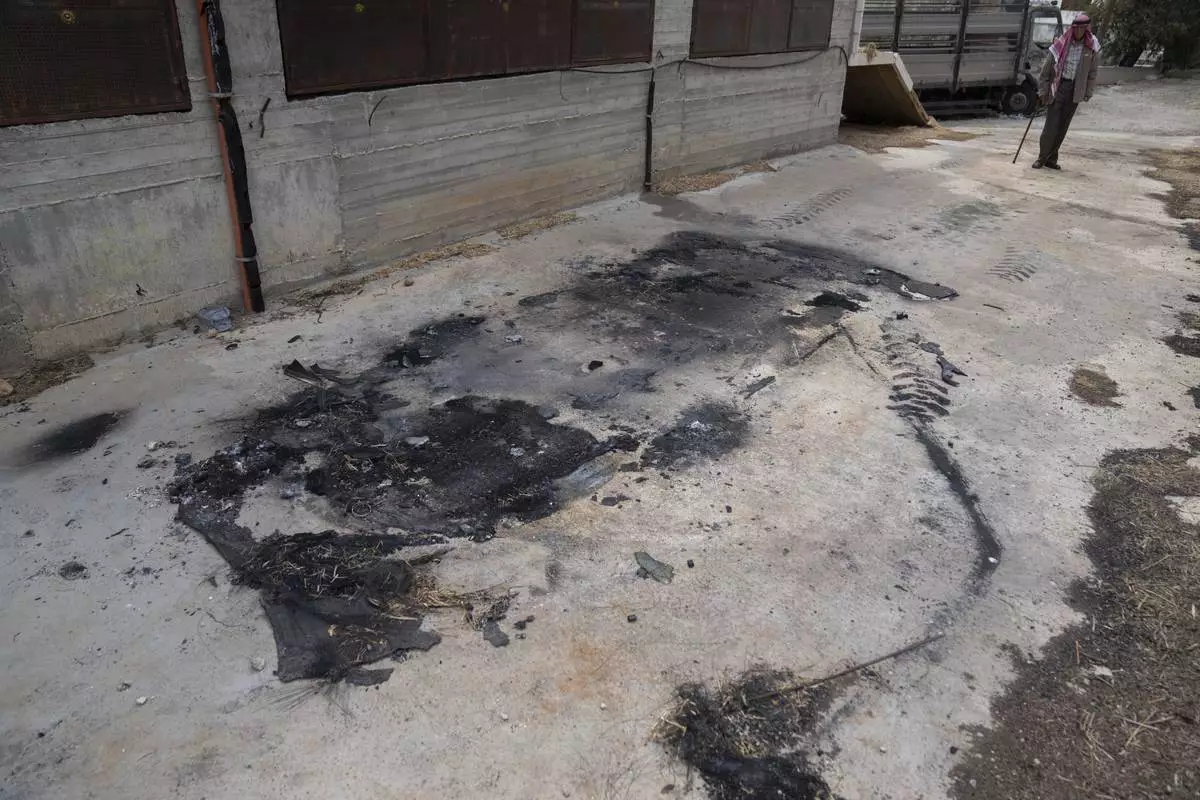
Fathi Dawabsha, 82, walks toward the remains of a family vehicle that was torched during an attack by Israel settlers last month, in the West Bank village of Duma, Tuesday, April 30, 2024. (AP Photo/Nasser Nasser)
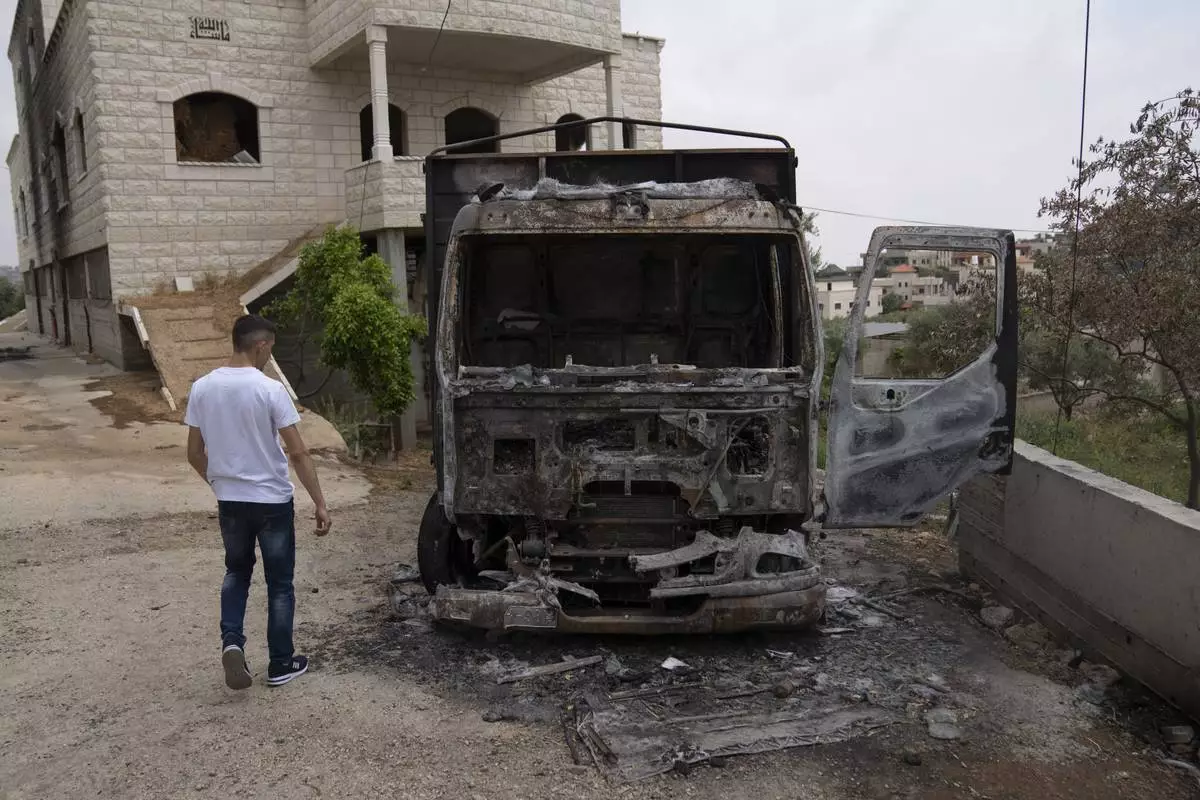
Fatahi Mohammad, 20, walks past his family's truck that was torched during an attack by Israel settlers last month, in the West Bank village of Duma, Tuesday, April 30, 2024. (AP Photo/Nasser Nasser)
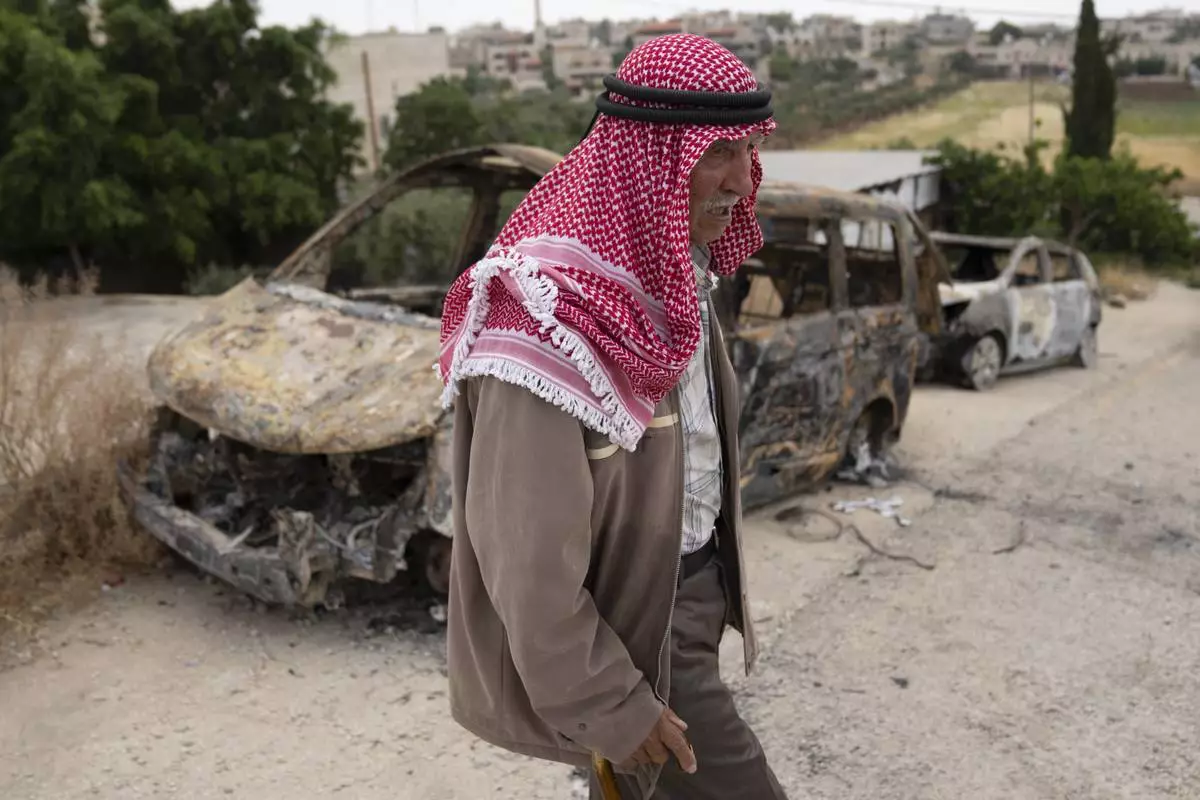
Fatahi Dawabsha, 82, walks past his family's vehicles that were torched during an attack by Israel settlers last month, in the West Bank village of Duma, Tuesday, April 30, 2024. (AP Photo/Nasser Nasser)
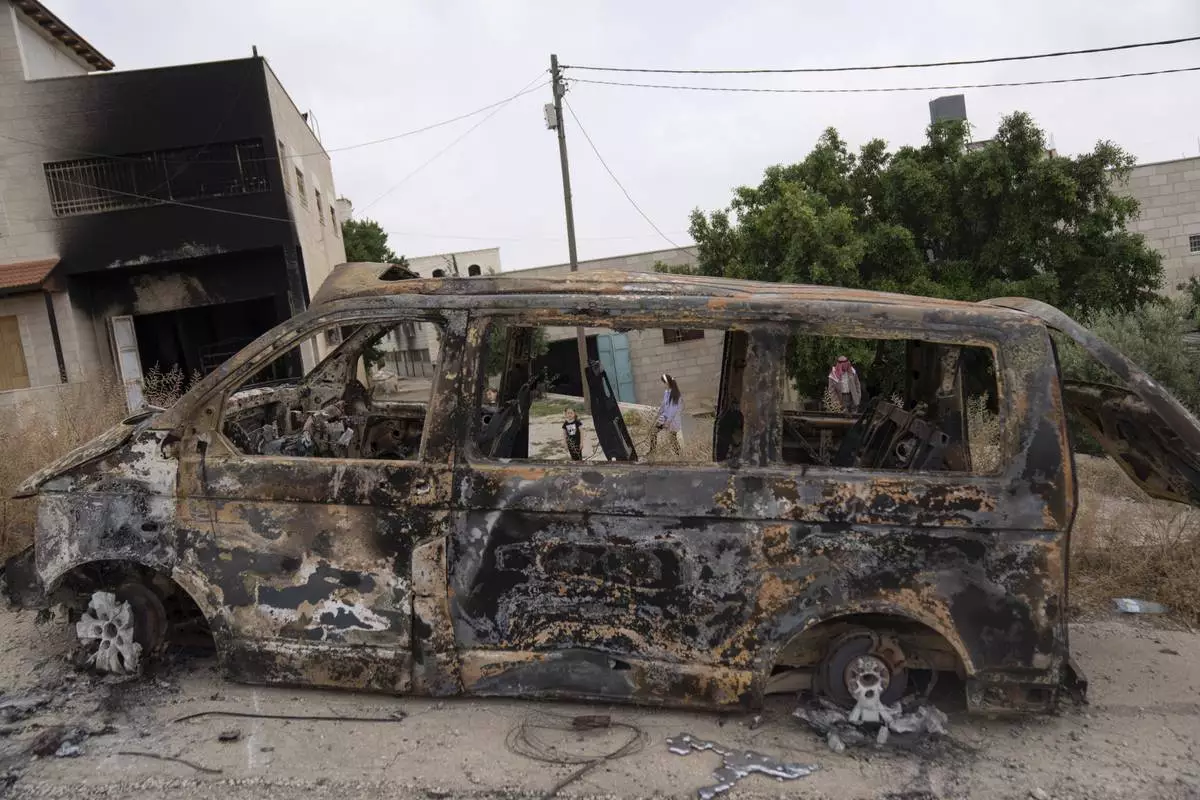
House and vehicles of Ibrahim Dawabsha and his family that were torched during an attack by Israel settlers last month, in the West Bank village of Duma, Tuesday, April 30, 2024. (AP Photo/Nasser Nasser)
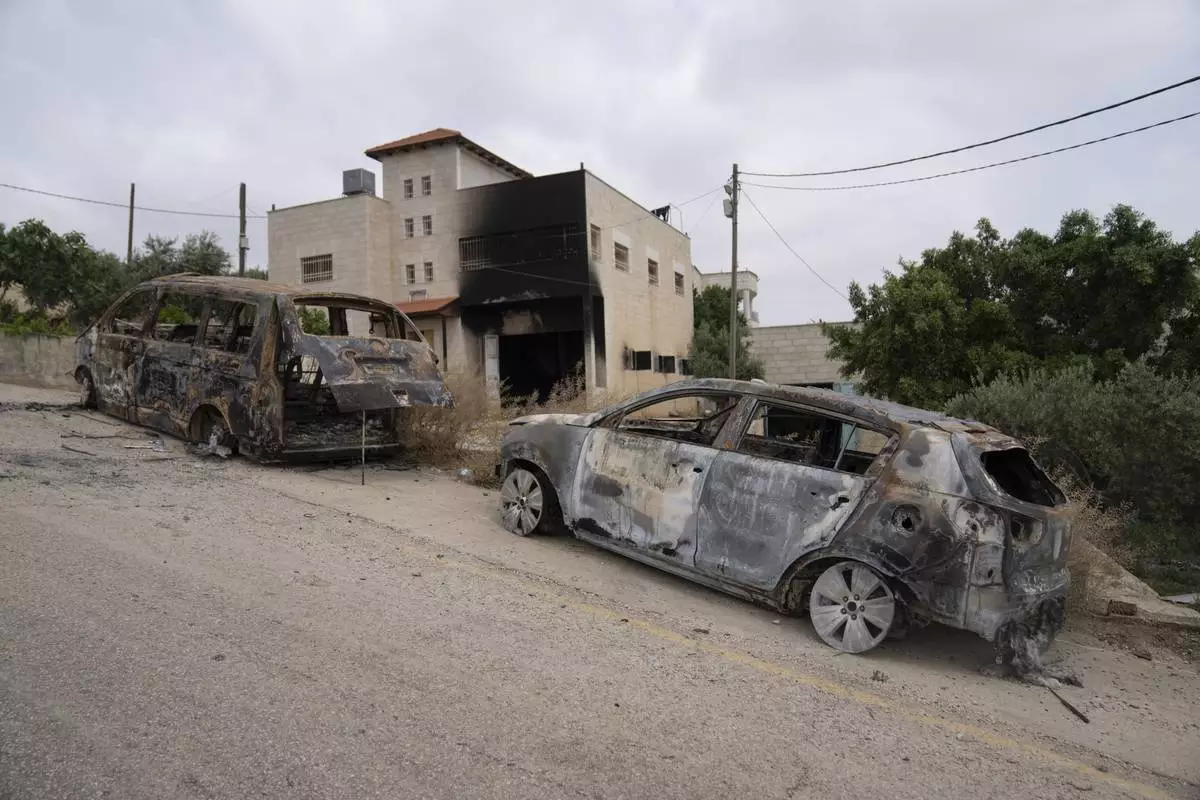
House and vehicles of Ibrahim Dawabsha and his family that were torched during an attack by Israel settlers last month, in the West Bank village of Duma, Tuesday, April 30, 2024. (AP Photo/Nasser Nasser)

















